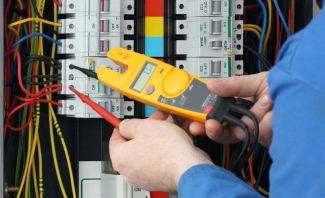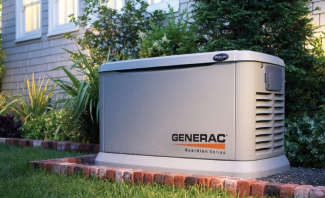The 5 Clear Indications Your Generator Requires Repair! Get Expert Tips for Locals and Find the Perfect Repair Services
Are you a local who relies on a generator for power during outages? Stay ahead of any necessary maintenance and repairs by knowing the signs that your generator needs repair. Our experts have reviewed the top 5 signs indicating your generator may not be working correctly. Don’t let another unexpected outage catch you off guard. Read on to ensure your generator keeps running optimally.
Don’t Ignore Unusual Noises from Your Generator – Act Now and Save Time and Money!
While generators are known for their reliability and efficiency, they’re not immune to developing problems that can manifest as strange noises. These noises can be signs of various issues – from simple repairs to urgent professional attention.

One common noise to listen for is a knocking sound. It may indicate loose or damaged parts that, if left unattended, could cause further damage and ultimately lead to the generator’s breakdown.
Another noise to be on the lookout for is a whine. This could be a red flag for problems in the electrical system, such as a short circuit. Delaying action could result in costly repairs to the generator’s electrical components.
Remember, ignoring these unusual noises is not the answer. Regular maintenance can prevent minor issues from becoming major headaches, and early detection can save you both time and money. If you’re unsure about any strange noises coming from your generator, it’s always best to seek the advice of a professional generator expert and resolve the issue promptly.
Ensure Optimal Performance: Check Your Generator’s Voltage Output Regularly
Choosing the right generator involves more than just capacity and features. One crucial aspect to consider is the voltage output. Low voltage output can lead to equipment failures, blackouts, and other undesirable consequences. Don’t let that happen to you – make sure your generator’s voltage output aligns with its specifications.
Why does this matter? Well, the voltage output of a generator is measured in volts (V) and should match the generator’s specifications. You can usually find this information on the generator’s nameplate. Different models and manufacturers may have different voltage output requirements, so it’s important to check and ensure you’re within the right range.
To check the voltage output, you’ll need a multimeter. Here’s what you do: start the generator and let it stabilize for a few minutes. Then, connect the multimeter and measure the voltage at the generator’s output terminals. Simple, right?
What if you find that the voltage output is too low? There could be various reasons for this, such as a faulty voltage regulator or disconnected wires. Even heavy loads can affect the output. In any case, it’s best to consult a professional for diagnosis and repair.
Make checking the voltage output a part of your regular generator maintenance routine. By addressing any low voltage issues promptly, you’ll ensure optimal performance and avoid potential damage to your generator and equipment.
Don’t leave your generator’s voltage output to chance. Take control and check it regularly for peace of mind and a reliable power supply.
Attention: Address Generator Leaks Immediately for Safe and Efficient Operations
Generators are essential for industrial activities, powering machinery and equipment reliably. However, leaks can pose serious risks if not dealt with promptly. While a small amount of oil leakage is normal, significant or recurring leaks demand urgent attention.
Generator leaks can lead to oil escaping and potentially contaminating the environment, particularly if located near sensitive areas such as water sources or wildlife habitats. Furthermore, prolonged leaks can cause extensive damage to the generator, resulting in costly repairs or even replacement.
To prevent further damage or contamination, it is crucial to act quickly when addressing generator leaks. This may involve shutting down the generator, carefully inspecting it to identify the source and extent of the leak. Simple solutions, such as fixing a damaged seal or gasket, may be sufficient in some cases. However, more complex repairs or replacement parts may be necessary in others.
By promptly addressing generator leaks, you can ensure safe and efficient operations for years to come, while minimizing negative impacts on the environment and surrounding equipment.
Alert: Fuel Smell Detected Near Your Generator – Immediate Action Required!
Smelling fuel near your generator is a serious matter that demands your immediate attention. It could signify a fuel leak, posing a grave risk to your safety and health. Not only does a fuel leak increase the chances of a dangerous fire, but it also releases toxic fumes that can harm you.
Common culprits for fuel leaks in generators include damaged fuel lines or tanks, loose connections, and carburetor or fuel pump issues. If you notice the smell of fuel near your generator, turn it off immediately and take immediate steps to identify and fix the problem.
Remember, attempting to address a fuel leak without the proper expertise can worsen the problem and put your generator at greater risk. Seek assistance from a certified professional electrician if the leak stems from a damaged fuel line or tank.
Furthermore, even if you don’t detect a fuel smell, it is vital to perform regular maintenance checks on your generator to ensure its optimal functionality and safety. By taking precautionary measures, you can protect your property and well-being while ensuring the smooth operation of your generator.
Attention: Don’t Ignore Generator Overheating – It’s a Safety Hazard!

Generators are known for their heat-producing capabilities, but when they start to overheat, it’s time to take action immediately. Ignoring this issue can have dangerous consequences, including costly repairs and even the risk of fire accidents.
The main culprit of generator overheating is often inadequate airflow, caused by debris and contaminants blocking the cooling fins. To avoid this, stick to a regular maintenance schedule and ensure your generator is installed in a well-ventilated area.
If you notice your generator overheating, don’t try to fix it yourself. Call a certified expert right away. They’ll assess the situation, offer necessary repairs or maintenance, and keep you safe. Remember, your safety and peace of mind depend on expert assistance. Don’t wait, act now!
Maintaining Your Home Generator: The Key to Reliable Power
As a responsible homeowner, prioritizing the maintenance of your home generator is essential. Scheduled maintenance guarantees that your generator runs smoothly and efficiently when you need it most – during storms, blackouts, and emergencies.
Neglecting scheduled maintenance can lead to reduced efficiency, frequent breakdowns, and expensive repairs. A neglected generator is also more likely to fail when you least expect it, leaving you and your family without electricity.
To avoid these problems, it is recommended to schedule maintenance for your home generator every 6 to 12 months, following the manufacturer’s guidelines and considering the age of your generator. This maintenance should include checking filters, inspecting spark plugs, testing the battery, and ensuring the fuel system is clean and functioning properly. It is also wise to have a professional electrician perform a load bank test to verify voltage and frequency.
Not only does scheduled maintenance prevent costly repairs, it also extends the lifespan of your home generator. By keeping it in top condition, you can trust that it will provide reliable power in any situation.
By investing in preventive maintenance, you can avoid unexpected breakdowns and costly repairs, ensuring peace of mind and uninterrupted power whenever you need it.
Ensure a Reliable and Efficient Generator Repair: Find the Right Service Provider
Don’t let a malfunctioning generator leave you in the dark during crucial times. Whether it’s for your home or office, having a generator is essential for power outages and emergencies. But when your generator breaks down, it’s crucial to find a professional repair service that can get it up and running again in no time.
Consider these key factors when searching for a generator repair service that you can trust.
- Experience and Expertise: Look for a repair service provider with extensive experience in repairing generators of various makes and models. Their technicians should be highly trained and qualified, equipped to handle repairs and maintenance efficiently. Keeping up with the latest technology in the industry, they should be able to diagnose and fix any generator problem quickly.
- 24/7 Availability: Emergencies can happen anytime, day or night. That’s why it’s essential to choose a repair service that is available 24/7, all year round. A reliable provider should offer prompt onsite repairs to minimize downtime. Additionally, their dedicated customer service team should be ready to assist you with any concerns.
- Transparent Pricing: Avoid surprises when it comes to the cost of repairs. Look for a repair service that is transparent about their pricing policies. They should provide upfront cost estimates without hidden charges or extra fees.
- Quality of Service: Ensure you choose a generator repair service known for their high-quality repairs and maintenance. Check their website for customer reviews and testimonials to see what others have to say about their services. A trustworthy provider will also offer a warranty on their repair work for your peace of mind.
Finding a professional generator repair service requires thorough research and careful consideration. With the right company, equipped with experience, availability, transparent pricing, and a reputation for quality service, you can trust that your generator will stay reliable for years to come.
Ensure the smooth operation of your home generator by taking necessary precautions to avoid safety risks and inefficiency. Keep a close eye on any unusual noises, fuel odors, leaks, or overheating. Regularly check the voltage output and promptly address any issues or maintenance needs with a trusted service provider. These proactive measures will save you time and money in the future. Act now to guarantee the reliability and efficiency of your backup power source when you need it most.
https://www.google.com/maps?cid=3969260459347426251
